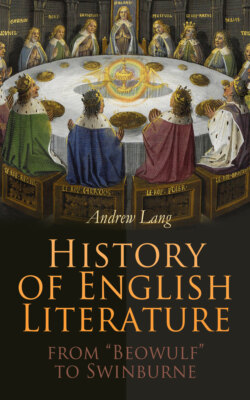Читать книгу History of English Literature from "Beowulf" to Swinburne - Andrew Lang, Robert Kirk - Страница 13
На сайте Литреса книга снята с продажи.
The Fight at Finnsburg.
ОглавлениеIn a song of the gleeman at Hrothgar's house in "Beowulf," there are obscure references to the slaying of Hnæf, brother of Hildeburh, wife of the Frisian King Finn, and the slaying of Hildeburh's own sons by the men of Hnæf, in a fight within the royal hall of Finn. They are all burned together on the funeral pyre, while Hildeburh weeps for sons and brother. A fragment of an Anglo-Saxon epic on this affair exists only in one copy, the original is lost. It is a complicated story of slayings and revenges among folk akin by marriage, and the interest clearly lay in the tragic situation of Hildeburh, who owes vengeance against her husband, Finn, and also against the family of her brother, who have slain her sons. As Hildeburh returns to her own people, the Danes, after her husband is killed, she probably preferred her own blood kindred to those of her husband.
1. The best versions for English readers of these splendid stories are to be found in "The Volsungs and the Niblungs," translated by William Morris and Magnusson, and in "The Corpus Poeticum Boreale," with translations by F. York Powell and Vigfusson.
2. This form of verse has been described thus by Prof. Saintsbury:—
"The staple line of this verse consists of two halves or sections, each containing two 'long,' 'strong,' 'stressed,' 'accented' syllables, these same syllables being, to the extent of three out of the four, alliterated. At the first casting of the eye on a page of Anglo-Saxon poetry no common resemblance except these seem to emerge, but we see on some pages an altogether extraordinary difference in the lengths of the lines, or, in other words, of the number of 'short,' 'weak,' 'unstressed,' 'unaccented' syllables, which are allowed to group themselves round the pivots or posts of the rhythm, that is, round the syllables on which strong stress is laid."
The eye and ear of the reader soon find out the essential facts of the measures; the strong pause in the middle of each verse, the alliteration, the accent, and the great variety in the number of the syllables which are slurred, or not dwelt upon, in each case. The poetry avoids rhymes, except in "The Rhyming Poem," later than King Alfred's time, and in two or three Other instances.
3. The words are:—
Ic me mid Hruntinge
dóm gewyrce, otthe mec death nimeth.
I (Ic, German Ich) with (German mit) Hrunting, glory will win, otherwise (otthe) me (mec) death taketh (nimmeth), German nehmen ("to take").
4. Translated from a lost German form; the Latin is of the tenth century, by Ekkehard of St. Gall.
